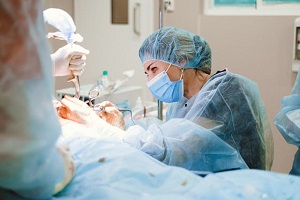What are the Effects of Salpingectomy on Women?
The fallopian tubes are crucial components of the female reproductive system, responsible for transporting eggs, providing a site for fertilization, and guiding fertilized eggs into the uterine cavity. The inner walls of the fallopian tubes are lined with cilia, whose movement, along with the contraction of the tube's muscles, aids in the movement of eggs and fertilized embryos. The fallopian tubes play an indispensable role in the fertility process of women.

Salpingectomy, a gynecological procedure, is typically performed to treat conditions such as ectopic pregnancy, tubal blockage, hydrosalpinx, severe pelvic inflammatory disease, or as a permanent contraceptive measure. However, this surgery may impact a woman's body and life.
So, what are the effects of salpingectomy on women?
1. Reduce Natural Conception Probability
The fallopian tubes are where eggs and sperm meet and fertilization occurs. After the fallopian tubes are removed, eggs and sperm cannot meet naturally, significantly reducing the likelihood of natural conception. This is undoubtedly a significant change for women who plan to conceive naturally.
2. Impact on the Endocrine System
The fallopian tubes are connected to the endocrine system. Removal of the fallopian tubes may impact the body's hormone balance. Although this impact is relatively minor, it may still cause fluctuations in hormone levels. Secretion of hormones such as estrogen and progesterone may be affected to some extent.
Changes in hormone levels may also affect the menstrual cycle, leading to irregular periods and increased or decreased menstrual flow, among other conditions. However, these effects vary among women; some may not experience significant menstrual changes.
3. Lead to Pelvic Adhesions
Salpingectomy may stimulate the pelvic area, leading to adhesions of pelvic tissues. This can cause menstrual irregularities and, in severe cases, may even lead to intestinal obstruction.
4. Risk of Infection
If local hygiene is not maintained correctly after surgery or if the surgical site is not thoroughly disinfected during the procedure, there is a risk of bacterial infection at the removal site, potentially triggering inflammation. In severe cases, this could lead to significant local bleeding, endangering the patient's health.
5. Premature Ovarian Failure
The fallopian tubes participate in the reproductive process and transport nutrients. Removal of the fallopian tubes may affect the blood supply to the ovaries, leading to premature ovarian failure. Patients should pay attention to adequate nutrition and rest and avoid strenuous exercise post-surgery.
Salpingectomy may also have some potential impacts on a woman's daily life. For example, some women may experience limitations in physical activities and need to adjust accordingly based on their physical condition. Additionally, there may be effects on sexual activity, with women potentially needing more time to regain sexual interest and function.
Overall, the effects of salpingectomy on women are multifaceted, impacting fertility, hormonal balance, psychological well-being, and quality of life. However, faced with this situation, women need not be overly pessimistic or anxious.
Whether fallopian tubes need to be removed depends on factors such as the nature and severity of the condition and its impact on fertility needs. Traditional Chinese Medicine, such as the Fuyan Pill, can often be effective for mild conditions like mild tubal inflammation, adhesions, hydrosalpinx, or blockages. This treatment clears heat, detoxifies, kills bacteria, reduces inflammation, and repairs damaged fallopian tubes, potentially avoiding removal.
However, in cases of severe damage to the fallopian tubes, such as obstructions, cysts, or severe infections that affect fertility or cause recurrent pain and inflammation, surgical removal (e.g., laparoscopic or hysteroscopic surgery) may be necessary. This is particularly true when conditions lead to infertility or increase the risk of ectopic pregnancy.
Recommend readings:
Is a Fallopian Tube Examination Painful?
It Is Found that Salpingectomy Can Prevent Ovarian Cancer
Blocked Fallopian Tubes: Is Laparoscopic Surgery for Clearance Necessary?
Why is Laparoscopy Not Recommended for Hydrosalpinx?
previous pageDoes Hydrosalpinx Indicate Fallopian Tube Blockage?
next page- Is Fallopian Tube Blockage Causing Your Lower Abdominal Pain?
- Hydrosalpinx and IVF: What Are the Chances of Successful Embryo Implantation?
- How Reliable Is Uterus-Preserving Surgery for Adenomyosis?
- Resistance During Fallopian Tube Examination May Indicate Mild Blockage
- What Should Patients with Fallopian Tube Blockage Pay Attention to in Their Daily Life?
Testimonials
- Adenomyosis with Ureaplasma Urealyticum Cured by Fuyan Pill
- Tubal blockage with hydrosalpinx can be cured by TCM shortly
- Fuyan Pill Helps A woman with Adenomyosis Get Pregnant
- A Woman with Hydrosalpinx Is Cured with Fuyan pill
- Pelvic Inflammatory Disease Testimonials
- Irregular Vaginal Bleeding and Endometrial Thickening Cured by Fuyan Pill
- Pruritus Vulvae and Frequent Urination: Mycoplasma Infection Cured after 2 Courses



